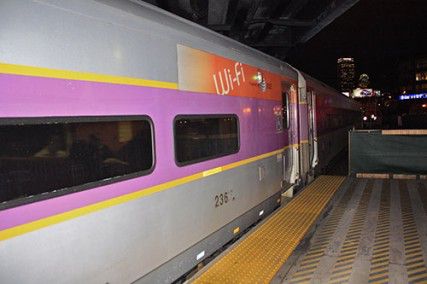
The Massachusetts Bay Transportation Authority announced its intention to enhance the amenities given to customers on its trains and ferries by upgrading and expanding the availability of wireless Internet across the transit system.
The MBTA announced it is seeking proposals to “provide Wi-Fi service on commuter rail cars, ferries and select commuter rail stations,” according to a press release Friday.
MBTA deputy press secretary Kelly Smith said the plan is to provide wireless service to all of the 410 commuter rail coaches operated by the MBTA, on all the ferries and at select train stations — North Station, South Station and Back Bay Stations on the commuter rail.
“Currently around 240 trains have Wi-Fi. With this plan, all trains and ferries will have Wi-Fi,” she said. “We are hoping that [implementation] will start in the fall of 2013, and will finish in about six to eight months.”
About 50,000 commuters use the current Wi-Fi system that is in place on the commuter rail on a daily basis. The current contractor for wireless service on the commuter rail is AT&T and they can bid again for the service deal, Smith said.
MBTA General Manager Beverly Scott said in a press release Friday that increased Wi-Fi service is the next step in providing better service to commuters.
“The opportunity to have sponsorship of our WIFI service will aid in our goal of bringing a high-quality WIFI experience to our customers throughout the commuter rail system without the MBTA or our riders incurring any cost for it,” she said. “It really is a win-win.”
Smith said increased Wi-Fi would not be a financial burden for the MBTA
“This will not cost the MBTA anything, this will be a service-partnership program,” she said. “Whoever successfully bids for it will get a certain advertising and commercial partnership with the MBTA.”
This type of commercial partnership is not unique to transit systems. The Metropolitan Transportation Authority, which runs the Metro-North and LIRR systems, announced in November that its wireless network in Grand Central and the Park Avenue tunnels would come at no cost to the MTA.
“This deal will provide significant improvements in customer service, railroad operations and emergency management in GCT, all at no cost to MTA or Metro-North,” said Metro-North President Howard Permut in a press release from Nov. 29. “This network will improve radio communication for our operating department employees, the MTA Police and other first responders.”
Commuters expressed mixed feelings about the increased W-Fi capabilities.
Jenna Goldblatt, 25, from Boston, said Wi-Fi would make her commute easier.
“What the MBTA is doing is beneficial to business people, college students, young professionals and just regular people, since so many people need Internet access today,” she said. “I can access things on my smartphone or laptop easier and it provides for something to do when riding the train.”
Jordan Evangelista, a senior at Boston University in the School of Management, said he takes the MBTA Commuter rail 15 to 20 times a year to his home in Providence, but that added Wi-Fi would not affect him.
“The Wi-Fi improvement doesn’t really help me that much,” Evangelista said. “I’m usually just on my phone, sleeping or talking to my friends on the commuter rail. It doesn’t make a difference really.”
BU Professor Kathleen Martin of the College of General Studies said she used to commute on the train daily for six years.
“Internet access wouldn’t have helped me on commuter rail rides,” she said. “I generally spent my time inbound going over my class preparations, and spent my time outbound either recuperating from my day or going over class preparations.”
Martin said a possible outcome of increased Wi-Fi for commuters is employers encouraging longer work hours.
“The Wi-Fi on the commuter rail could be used by their bosses as an excuse to make them start work earlier and end work later,” she said.












































































































